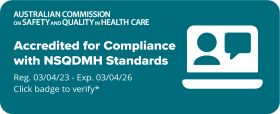Accessibility Tools
- Content scaling 100%
- Font size 100%
- Line height 100%
- Letter spacing 100%
The SANE Blog

Living with OCD in the time of COVID
In SANE's COVID mental health series, Bronwyn reflects on life with OCD. She offers some tips to help lower anxiety and cope in these challenging times.
Living with a diagnosis of obsessive compulsive disorder (OCD) means everyday life is often a challenge at the best of times.
I’m always wondering what the next ‘obsession’ will be. What will my brain decide to irrationally cling to this week? It never really goes away, even in my ‘clear’ weeks my brain is ticking away in the background prompting me to obsess over something. OCD is absolutely exhausting.
Of course, it’s not the best of times right now. COVID has taken over all of our lives and there isn’t a single person I know that hasn’t felt the impact of this new normal that has essentially turned everything we rely upon upside down and inside out within a matter of weeks.
For me, my OCD has always been related to health issues and contamination – so a global pandemic sounds nothing short of terrifying for a person who has irrationally diagnosed herself with every disease under the sun since her teenage years – right?
Wrong. I have somehow managed to remain somewhat calm, in control and relatively OCD flare-up free since February. I’ve spoken to my husband and my friends about this at length, particularly as they were mentally preparing for me to spiral into a whirlwind of anxiety that they would have to help lift me out of; and I’ve got to be honest, I don’t really understand how I’ve managed to keep the OCD monster at bay.
After a great deal of reflection, I’ve got a few theories and ways in which I’m getting through this situation. I hope that by sharing them, you might be able to use these tips to help alleviate some of your own anxiety. After all, I’m certainly not special in my fears surrounding COVID, we’re all in this rickety boat together.
This isn’t forever. I have been repeating this tiny sentence to myself several times a day. When I’m feeling overwhelmed, I think of something I can’t wait to do once we get out of lockdown. For me, it’s going out for brunch with my husband and young son and afterward meeting friends at the park for a play with the kids. I miss playdates almost as much as my four-year-old – but I do know that we will get to have them again soon, and that they will be wonderful.
Control. OCD is in part, for me at least, about control. I can control how I reduce my risk of contracting COVID-19. I can stay in my home as much as possible only leaving for some daily exercise. When I must go to the supermarket for essentials, I will wear disposable gloves and wipe down the trolley handle. I will go through the self-checkout or pack my own groceries. I will do my very best to stay 1.5 metres away from others at all times. I will thoroughly wash all of my fresh produce when I get home.
Things I can’t control. This is the scary one. I can be in control of my own behaviour, but I can’t necessarily control others. This is something that has always played into my OCD, and is especially prominent right now. I cannot control if someone in the supermarket pushes past me to grab the last packet of spaghetti. I cannot control if someone behind me in line to pay for my groceries coughs without covering their face. What I CAN do, however, is then adopt all my ‘controlled’ actions, such as wiping down anything that our coughing friend may have spluttered over with some antibacterial spray once I get home.
Exercise. The biggest cliché in the treatment of mental illness, I know. But I cannot overstate the importance of moving my body every day. If I’m not going for a walk around the block, I’m stretching and using free weights in the back yard. Some days it might be chasing my son around in the driveway as he hurls tennis balls at my head (we’re working on his cricket skills). I certainly know the difference on the days I haven’t done something physical – I feel sluggish, and it’s harder to control intrusive thoughts.
Practising self-care. For me, self-care is about ensuring I’ve followed my mental health plan as I would every other day of the year. I take my medication before bed and reflect on how I’ve been feeling about everything throughout the day. Am I feeling in control? Do I need to look at making an appointment with my GP or Psychologist to check in soon? I then focus on the feel-good stuff. I might do some reading, have ‘couch time’ with my family, break out the grown-ups colouring book (if you haven’t got one, I cannot overstate how relaxing these are), paint or listen to music. These are all small activities that I mindfully insert into my day so that I’m feeling content, loved and secure. Self-care is, however, different for each individual. Some people love to meditate, take a bath, draw, cook, the list goes on! Whatever it is that has you feeling positive and peaceful, make sure you try to do it every single day.
This is my experience, and of course, others living with OCD and/or other anxiety disorders may have an entirely different take on the current situation. There is no right or wrong way to handle isolation and enormous changes to your daily routine, but what you can do is check-in with each other and know that there are services available to assist you or those you care about. Our SANE forums are online 24/7, and our help centre is open for you to call from 10am-8pm, Monday – Friday.
By accepting you will be accessing a service provided by a third-party external to https://www.sane.org/










